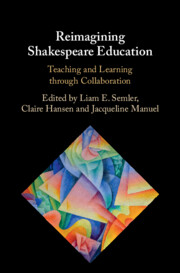Book contents
- Reimagining Shakespeare Education
- Reimagining Shakespeare Education
- Copyright page
- Dedication
- Contents
- Figures
- Tables
- Notes on Contributors
- Acknowledgements
- Introduction
- Part I Reimagining Shakespeare with/in Schools
- Introduction
- Chapter 1 Shakespeare Schools Foundation
- Chapter 2 Shakespeare and Citizenship in France
- Chapter 3 Bell Shakespeare
- Chapter 4 The Better Strangers/Shakespeare Reloaded Project
- Part II Reimagining Shakespeare with/in Universities
- Part III Public Reimaginings
- Part IV Digital Reimaginings
- Part V Reimagining Performance
- Afterword
- Index
- References
Chapter 3 - Bell Shakespeare
Exploring the Power of Shakespeare in Primary School Contexts
from Part I - Reimagining Shakespeare with/in Schools
Published online by Cambridge University Press: 02 February 2023
- Reimagining Shakespeare Education
- Reimagining Shakespeare Education
- Copyright page
- Dedication
- Contents
- Figures
- Tables
- Notes on Contributors
- Acknowledgements
- Introduction
- Part I Reimagining Shakespeare with/in Schools
- Introduction
- Chapter 1 Shakespeare Schools Foundation
- Chapter 2 Shakespeare and Citizenship in France
- Chapter 3 Bell Shakespeare
- Chapter 4 The Better Strangers/Shakespeare Reloaded Project
- Part II Reimagining Shakespeare with/in Universities
- Part III Public Reimaginings
- Part IV Digital Reimaginings
- Part V Reimagining Performance
- Afterword
- Index
- References
Summary
In 2013 Bell Shakespeare, Australia’s national theatre company specialising in Shakespeare in performance, education and community settings, formalised their primary Shakespeare programme. The programme includes in-school performances of Shakespeare’s plays specially scripted for young audiences, immersive workshops and teacher professional learning opportunities.
The authors share their own early experiences with Shakespeare before discussing why adults and secondary students sometimes develop negative perceptions of Shakespeare’s works. The potential of introducing Shakespeare in primary contexts is then explored. The findings from initial exploratory research with participant teachers and students in three diverse schools together with the perspectives and experiences of the Company suggest primary children readily engage with Shakespeare’s stories, characters and language. Many of the themes resonate with young learners’ lives and imaginations. Finally, Bell Shakespeare’s arts-rich pedagogy and principles for optimising the introduction of Shakespeare’s work to primary students are detailed.
- Type
- Chapter
- Information
- Reimagining Shakespeare EducationTeaching and Learning through Collaboration, pp. 54 - 68Publisher: Cambridge University PressPrint publication year: 2023



